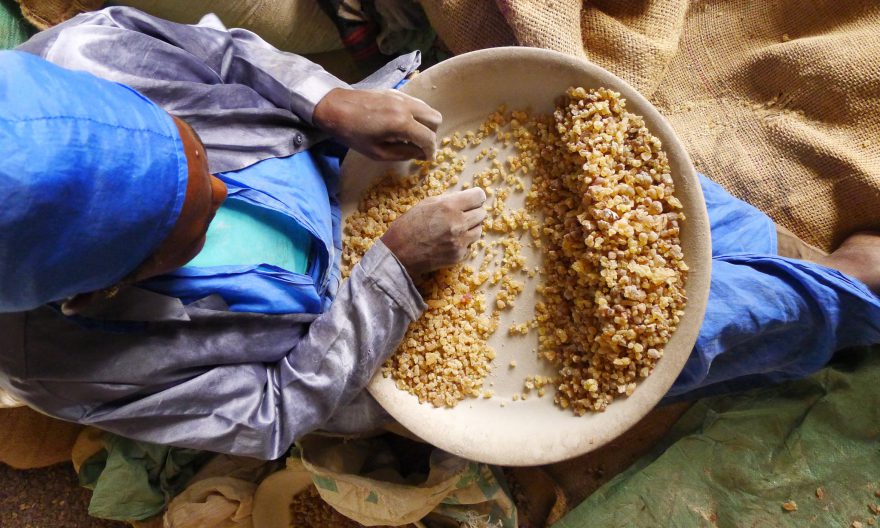
BY MENGISTEAB TESHOME
Even before the Wise Men gave frankincense as a gift, people were climbing the rugged Somaliland mountains in search of the precious resin. But rising global demand is threatening the ancestral forests where it is found.
Gold, frankincense and myrrh – the gifts offered to baby Jesus by the three wise men, so goes the story of the nativity, according to the Bibile. Even today, frankincense remains a precious Christmastime gift – but the reality behind its harvest differs somewhat.
The rocky Cal Madow mountains of Somaliland, a self-declared autonomous republic in Somalia’s northwest, are one of the few homes internationally to wild frankincense trees. One of the species located in the area is endemic and cannot be found anywhere else in the world.
Harvesting these trees is the second main livelihood for local people in Somaliland, who risk their lives to meet the global demand. However, interest in the natural product is rising at such a rate that trees cannot regenerate fast enough.
While once inherently related to the holy paradise, frankincense might end up representing a real hell for local people in Somaliland.
“It will be a disaster not only for the people of Somaliland, but for the whole world,” Ahmed Ibrahim Awale, president of the Somaliland Biodiversity Foundation, told DW. “It will be the end of unique species and of a millenarian heritage.”
The increasing global appetite Frankincense is still very much used in religious ceremonies, but it is no longer only reserved for honoring deities. Multimillionaire markets such as the French perfume business count the tree fragrance among their top components.
While local people in Somaliland have harvested frankincense for millenniums, the current rhythm to meet the global appetite for essential oils leaves few options for sustainability – and these ancestral forests cannot replenish fast enough to survive the current overharvesting.
“Frankincense has been harvested in a sustainable manner for millions of years,” Awale said. “But the rise in the global demand has completely changed it.”
Harvesting in an unsustainable way means making a higher number of cuts per tree to extract as much sap as possible and tapping the trees year-round rather than seasonally. These practices weaken the trees, impede them from recovering and, ultimately, means they end up dying.
Of late, the Future Forest Appeal, run by the charity Tree Aid, had signed agreements that aim to provide communities living in the town of Metema, located in the northwest of the East African country, with the tools needed to restore around 10,000 hectares of degraded forest.
Much of the land in the area has become infertile and unsuitable for growing crops, trees have disappeared, temperatures have risen and desert like conditions are spreading.
Celebrities including wildlife expert and conservationist Chris Packham and actresses Joanna Lumley and Zoe Wanamaker have all shown their support for the appeal.
The Metema forest in Ethiopia is made up of Boswelia trees. They’re known for producing a substance called frankincense, which is a precious tree resin that is used in essential oils around the world.
Without the necessary actions being taken, it’s believed the forest could become extinct in 20 years, negatively impacting the people living in the Sahel region.
Tree Aid says the Future Forest Appeal will work with close to 3,000 households to increase the money they’re able to make from sustainable frankincense production by 25 percent , while protecting and restoring 9,563 hectares of forest at the same time.
“People in the Sahel are living with the devastating effects of our global climate crisis,” said Chris Packham.
“Temperatures are rising, land is becoming infertile and the desert is spreading south, like a wave in slow-motion.
“I urge people to support the Future Forest appeal to back this inspiring African solution to the climate crisis,” he said.
The Future Forest project is part of the wider “Great Green Wall” campaign which is looking to restore 8,000 kilometres, which is equivalent to about 5,000 miles, of land across the continent of Africa.
The project will see the planting and regenerating of trees, water and soil conservation and the protection of existing forests, many of which have been badly hit by the climate crisis.
Local communities will also be trained and equipped with the right tools to protect their resources.
Tree Aid’s scheme aims to prevent the further spread of the Sahara Desert which could threaten people’s food security and jobs. Once complete, the Great Green Wall will be the largest living structure on the planet, according to the charity.
The Ethiopian Herald April 16/2021


